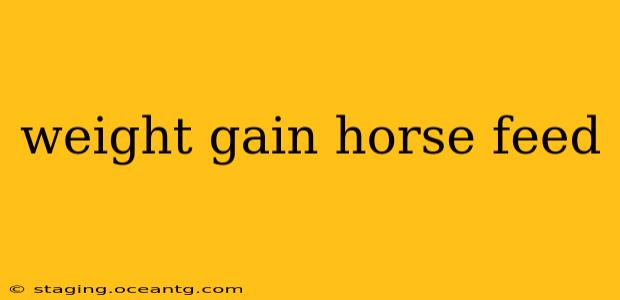Is your horse looking a little too thin? Weight gain in horses requires a multifaceted approach, and choosing the right feed is a crucial first step. This comprehensive guide delves into the world of weight gain horse feed, exploring various options, nutritional considerations, and essential factors to ensure your equine companion achieves a healthy weight.
What Type of Horse Feed Promotes Weight Gain?
The best type of horse feed for weight gain depends on your horse's individual needs, age, activity level, and any underlying health conditions. However, generally, feeds high in calories and digestible energy are key. This often translates to feeds with:
- High-fat content: Fats are highly caloric and easily digestible, providing a significant energy boost. Look for feeds that list vegetable oils (like soybean or corn oil) or added fat sources in their ingredients.
- High-quality protein: Protein is essential for muscle development and overall health, contributing to a healthy weight gain rather than just fat accumulation. Choose feeds with easily digestible protein sources like alfalfa or soy.
- High fiber: While seemingly counterintuitive for weight gain, high-fiber feeds support gut health and digestion, allowing your horse to absorb more nutrients from the feed. This doesn't mean low-quality hay, however; high-quality hay with adequate calories is essential.
- Added vitamins and minerals: Ensure your chosen feed includes a balanced supplement of essential vitamins and minerals to support overall health and optimal nutrient absorption.
Avoid feeds with high levels of fillers or low-quality ingredients. These offer minimal nutritional value and may not provide the necessary calories for weight gain.
What are the best horse feeds for weight gain?
There's no single "best" feed; the ideal choice depends entirely on your horse. Some popular options often recommended for weight gain include those specifically formulated for senior horses (as they often require higher calorie diets) or those designed for hard keepers—horses that naturally struggle to maintain weight. Always consult your veterinarian or equine nutritionist to determine the most suitable feed for your horse's specific needs. They can perform a body condition score assessment and recommend a tailored feeding plan.
How much horse feed should I give my horse to gain weight?
Overfeeding can be just as detrimental as underfeeding. The amount of feed you should provide depends on your horse's current weight, desired weight gain, body condition score, and activity level. A gradual increase in feed intake is generally recommended to avoid digestive upset. Start by slowly increasing the amount of feed over several weeks, monitoring your horse's weight and condition closely. Consult your veterinarian or equine nutritionist for a personalized feeding plan and to avoid potential health problems related to rapid weight gain.
What are the signs of weight gain in horses?
You'll notice changes in your horse’s overall appearance. Look for:
- Increased body weight: Regularly weigh your horse to track progress.
- Improved body condition score (BCS): A higher BCS indicates improved fat reserves. Learn how to assess your horse's BCS using a standard scoring system.
- Muscle development: Observe an increase in muscle mass, particularly around the hindquarters and neck.
- Improved coat quality: A healthier, shinier coat is often a sign of improved overall health and nutrition.
My horse is losing weight, what should I do?
Weight loss in horses is a serious concern and requires immediate attention. Consult your veterinarian immediately to rule out any underlying medical conditions. Weight loss can be a symptom of various health issues such as dental problems, parasites, or metabolic disorders. Your vet can perform a thorough examination and develop a treatment plan. Do not attempt to address weight loss through diet changes alone without veterinary guidance.
What supplements can I add to my horse's feed to aid weight gain?
While a well-balanced feed should provide most necessary nutrients, your veterinarian might recommend additional supplements depending on your horse’s specific needs. These might include:
- Fat supplements: To increase caloric intake.
- Protein supplements: To support muscle growth.
- Vitamin and mineral supplements: To ensure adequate nutrient intake.
Never add supplements without consulting your veterinarian or equine nutritionist first. Incorrect supplementation can be harmful.
How often should I feed my horse to gain weight?
The frequency of feeding depends on your horse's digestive system and the type of feed being used. Smaller, more frequent meals might be beneficial for horses with sensitive stomachs. However, for weight gain it’s often more effective to give larger meals. It's important to avoid leaving feed out all day, and to monitor the horse's feeding behavior. Consult your veterinarian or equine nutritionist for guidance on the best feeding schedule for your horse.
This information is for general knowledge and does not constitute veterinary advice. Always consult a qualified veterinarian or equine nutritionist before making any changes to your horse's diet or feeding regimen. They can provide personalized recommendations based on your horse's individual needs and ensure safe and effective weight gain.
